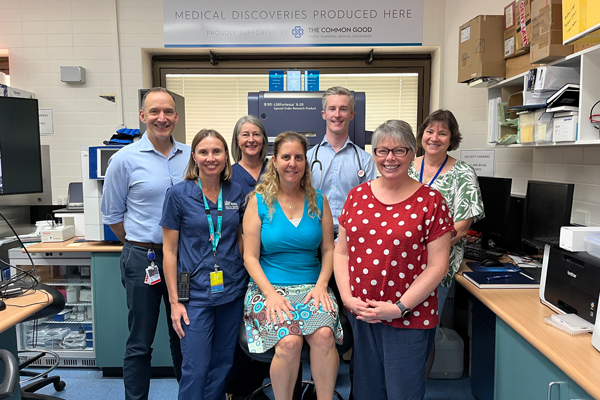- Foreword
- Message from Board Chair & Chief Executive
- 2023 Clinical Research Fellowships
- A message from the RBWH Foundation
- A message from The Common Good
- Metro North Research Excellence Awards
- Research stories
- ICU of the Future
- New approach ruling out pulmonary embolism
- Improving access to healthcare in the prison environment
- Safety and efficacy of peripheral versus centrally administered vasopressor infusion
- COVID-19 learnings set to inform future policy
- Telomere study could provide key to treating debilitating lung disease
- Productive Ward – Releasing time to care
- Brain organoids to revolutionise epilepsy treatment
- Reducing weight stigma in maternity care
- Parkinson’s Disease Check-In program giving people a voice
- Trial brings new treatment for common heart condition
- Teledentistry study shows promise in residential aged care
- Research fellow to boost Oral Health evidence-based care
- Study explores best approach to surgery for painful shoulder osteoarthritis
- The development and pilot testing of a stroke telerehabilitation decision toolkit
- Metro North Health delivers world-first breast scaffold surgery
- Regenerative jawbone hard at work care of collaborative Metro North Health approach
- Jamieson Trauma Institute leads e-scooter and e-bike injury research to drive community safety
- Forgotten fathers in pregnancy and obstetrics
- Putting the Spotlight on nursing and midwifery research
- Improving the health self-efficacy of stroke survivors
Telomere study could provide key to treating debilitating lung disease

Queensland Transplant Lung Service Tele-Scope study team
A research team from the Queensland Lung Transplant Service (QLTS) at The Prince Charles Hospital is investigating a possible treatment to slow the progression of a debilitating lung disease.
Idiopathic pulmonary fibrosis (IPF) is a serious chronic disease that affects the tissue surrounding the air sacs, or alveoli, in the lungs. This condition develops when the lung tissue becomes thick and stiff as a result of premature ageing. Over time, these changes can cause permanent scarring in the lungs called fibrosis, that makes it progressively more difficult to breathe.
The median survival for IPF is only four to six years from diagnosis.
The QLTS team is specifically studying the role that shortened telomeres in the lung play in the advancement of the condition.
Telomeres are DNA sequences found at the ends of chromosomes. They cap and protect the end of a chromosome like the end of a shoelace. Scientific studies have shown there is strong connection between short telomeres and cellular ageing.
People with pulmonary fibrosis experience a more rapid shortening of telomeres as they age, compared with people without the condition, with this shortening closely related to the severity of the condition.
Executive Director of Research for Metro North and Principal Investigator, Tele-Scope Study Professor Dan Chambers said that 25 to 30 percent of people with pulmonary fibrosis have telomere shortening which typically causes a more aggressive form of the disease.
“Clinical evidence shows us that people with the most severe forms of pulmonary fibrosis have shortened telomeres, which can be detected through a blood test,” Prof Chambers said.
“There are other clues to the diagnosis of a telomere disorder such as a person’s family history, early onset greying of hair, and other subtle blood test abnormalities.”
Currently, there is no curative treatment for patients with IPF with most patients prescribed antifibrotics which only slow disease progression.
Through this trial, researchers are testing whether Danazol, a synthetic hormone typically used in people with menstrual issues such as endometriosis, could potentially slow down the progression of pulmonary fibrosis by lengthening telomeres.
Pulmonary Fibrosis and Lung Transplant Physician Dr John Mackintosh said that existing treatments only target the end stage of the disease process, when most of the damage has already been done.
“Through our trial, we are hoping to target the underlying cause of pulmonary fibrosis, with the idea being that if we are able to lengthen a person’s telomeres this might ameliorate the progression of lung fibrosis,” Dr Mackintosh said.
“If we can show that this particular treatment has the potential to target the early stages of the disease, it provides a platform to conduct further intensive research into this important condition.
“In the long term, our goal is to identify a treatment that provides much improved survival and quality of life for patients with this debilitating disease.”
The team’s research has been supported by the National Health and Medical Research Council and the Medical Research Future Fund.
